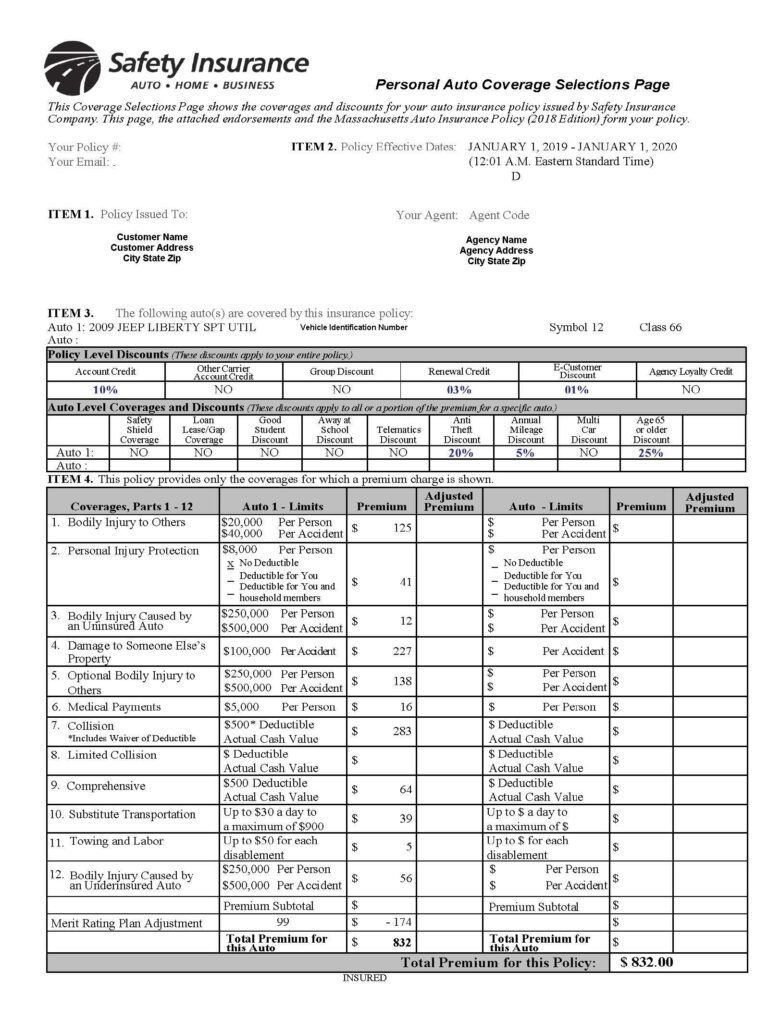Massachusetts is set to increase its minimum auto insurance liability limits, marking a significant shift in the state’s insurance regulations. The change aims to enhance financial protection for drivers and victims involved in automobile accidents by raising the baseline coverage requirements.This move comes amid ongoing efforts to address rising costs and improve road safety across the Commonwealth. Drivers are advised to review their current policies to ensure compliance with the new standards as they take effect.
Table of Contents
- Massachusetts Raises Minimum Auto Insurance Liability Requirements
- Impact on Drivers and Insurance Premiums Across the State
- Legal Implications for Accident Claims and Compensation
- Recommendations for Policyholders to Adjust Coverage Accordingly
- The Conclusion
Massachusetts Raises Minimum Auto Insurance Liability Requirements
Effective instantly,Massachusetts has increased its minimum auto insurance liability limits,requiring drivers to carry higher coverage amounts to better protect themselves and others on the road.The revised requirements mandate policyholders to upgrade their bodily injury liability limits, reflecting a response to rising medical costs and an effort to reduce the financial hardships incurred from auto accidents. This move positions Massachusetts to offer more robust protection for injury victims, ensuring that insurance payouts more closely match the realities of today’s accident-related expenses.
Key changes include:
- Higher minimum bodily injury limits per person and per accident
- Increased property damage coverage to cover more substantial vehicle repairs or replacements
- Enhanced requirements aiming to reduce uninsured and underinsured driver risks
Insurance providers statewide are adjusting their policy offerings to comply with these new minimum standards,which may lead to moderate premium shifts for many drivers. Experts encourage vehicle owners to review their policies promptly to avoid penalties and ensure full compliance with the updated regulations.
Impact on Drivers and Insurance Premiums Across the State
The recent increase in minimum auto insurance liability limits in Massachusetts is prompting drivers across the state to reassess their coverage and budgets. Many motorists will experience higher insurance premiums as carriers adjust rates to accommodate the enhanced liability thresholds. For some, this change means prioritizing the purchase of policies that now provide better financial protection in the event of accidents involving serious injuries or property damage.Experts advise drivers to explore their options carefully, noting that some insurers offer discounts and personalized coverage plans that can definitely help mitigate premium hikes without compromising protection.
Insurance providers and regulators emphasize that while premiums may rise, the new limits ultimately strengthen consumer safeguards, reducing potential out-of-pocket costs after severe incidents. Drivers should anticipate:
- More comprehensive liability coverage requirements that reflect modern cost realities in vehicle repairs and medical expenses.
- Opportunities to appeal surcharges or qualify for discounts based on driving history and other factors, as outlined by Massachusetts law.
- Collaboration with independent agents to tailor policies suited to personal risk profiles and budgets.
Navigating these adjustments will be critical for residents to ensure compliance and maintain adequate protection on the road.[[2]] [[1]]
Legal Implications for Accident Claims and Compensation
With Massachusetts raising its minimum auto insurance liability limits, the legal landscape for accident claims and compensation is set to become more stringent. Drivers involved in collisions must now be prepared for enhanced responsibilities when proving fault and coverage adequacy. These changes aim to ensure victims receive fair compensation, minimizing instances where insurance payouts fall short. In practical terms, this means greater scrutiny during the claims process, with insurers and legal professionals more frequently examining policy limits against actual damages incurred.
Key legal implications include:
- Increased likelihood of reaching settlement agreements that fully cover medical expenses, property damage, and lost wages due to higher liability thresholds.
- More complex litigation processes for cases where injuries and damages exceed the newly established minimum limits, potentially escalating to court proceedings.
- Heightened importance for drivers to understand their coverage details to avoid personal financial exposure beyond their insurance limits.
Recommendations for Policyholders to Adjust Coverage Accordingly
Policyholders in Massachusetts should promptly review their current auto insurance policies to ensure compliance with the newly increased minimum liability limits. It is crucial to coordinate with your insurance provider or broker to adjust coverage levels accordingly, preventing any gaps that might leave you exposed to significant financial risk in the event of an accident. Consider the following steps to stay ahead:
- Verify current coverage limits against the updated legal requirements.
- Request updated premium quotes based on increased liability limits.
- Evaluate the benefits of higher coverage options beyond the minimum mandates for enhanced protection.
- Explore potential discounts that might offset premium increases.
Additionally, policyholders are encouraged to utilize state resources such as the Massachusetts Automobile Insurance Plan (MAIP) if standard insurers are unwilling to adjust coverage. Staying informed about available discounts, surcharge appeals, and coverage endorsements through the Mass.gov portal can also help optimize your insurance portfolio. Taking a proactive approach to adjusting your policy not only ensures legal compliance but also strengthens your financial security on the road.
The Conclusion
The recent increase in Massachusetts’ minimum auto insurance liability limits marks a significant shift in the state’s approach to motorist protection.By raising the required coverage amounts, Massachusetts aims to ensure that drivers carry sufficient insurance to better cover the costs associated with accidents, thereby enhancing financial security for all parties involved. Motorists should review their current policies to comply with the new standards and avoid potential penalties. As these changes take effect,drivers in the Bay State can expect adjustments in their insurance obligations and premiums,reflecting a broader effort to improve road safety and accountability across Massachusetts roads. For detailed data on the updated requirements, drivers are encouraged to consult official state resources and their insurance providers. [1] [3]

